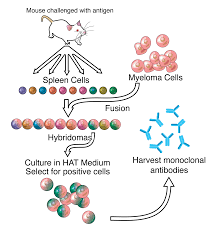
A new source of hope in the treatment of COVID-19, nearly a year after its emergence, is a therapy called monoclonal antibodies. This treatment is now being offered by Hatzalah of Baltimore. We asked Dr. Yosef Levenbrown, Medical Director of Hatzalah of Baltimore, to help us understand the treatment and to whom it is available.
Q: Dr. Levenbrown, what are
monoclonal antibodies?
A: Like the antibodies present in the
plasma of recovered COVID patients, monoclonal antibodies are designed to
attack something in the bloodstream that does not belong. Unlike plasma, these
antibodies are produced in a laboratory. They are given as an infusion which
takes about an hour to administer. Monoclonal antibodies are currently available
from two companies, Regeneron and Eli Lilly, under emergency use authorization
by the FDA. Emergency use authorization means that the decision to approve the
medication was based on limited data as other ongoing studies are being
conducted.
Q: In what way are monoclonal
antibodies helpful in fighting COVID?
A: One study showed decreased
hospitalizations and emergency room visits in the high-risk patients being
given this therapy. In addition, it was shown to possibly decrease the severity
of the symptoms the patients were reporting. But these effects only occurred
when this therapy was given early on in the course of the illness. Once someone
was sick enough to need oxygen or be hospitalized, it did not change the
outcomes.
Q: Have you personally seen this
benefit?
A: It is
important to understand that one cannot say that a therapy is beneficial unless
it has been shown to be beneficial in a proper trial. At the same time, the COVID Plasma Initiative (CPI) group
in New York has sent 1,000 high-risk patients for monoclonal antibody treatment
over the past few weeks. According to the data which they have been collecting,
fewer than 10 of the high-risk patients who had received this therapy have
subsequently required hospitalization. While this is encouraging news, it is
important to note that it is not a scientific study; it is more akin to
anecdotal evidence.
Q: Who is eligible for monoclonal
antibodies?
A: There are specific criteria,
determined by the FDA. Because of the current scarcity of this treatment, the
antibodies are reserved for those over 65 years of age or with a BMI of over 35
(morbid obesity), as well as individuals with various other risk factors who
have tested positive for COVID. (See the ad on page 91)
Q: How does one access this
treatment?
A: Hatzalah
of Baltimore, in conjunction with Operation Warp Speed, and with the help of
the COVID Plasma Initiative, now offers monoclonal antibody infusions. In order to obtain this therapy, a
doctor’s referral is required. The monoclonal antibody treatments must be given
within the first 10 days of illness. However, they are most effective when
administered within the first 72 hours of illness. It is therefore very
important to contact your doctor if you test positive for COVID and think you
may be eligible for this therapy.
Please note, if one has questions
about this therapy, please do not call the Hatzalah emergency line for
information. This number is for medical emergencies requiring Hatzalah. For
additional information about monoclonal antibody therapy, one can call the
Hatzalah Monoclonal Therapy Information Line at 410-585-0054 and press option
2, or email covidtherapy@hatzalahbaltimore.org.
Q: It seems as
though the community spread of COVID is very high. Do you know where people are
getting it?
A: According to the data from the
Star-K COVID testing site, we have seen different trends at different
times. “Household” exposure is always number one, and “unknown” exposure
is consistently number two. After these two, “friends” were the most
significant source of exposure until the recent holiday season in November and
December, when “family” became the key source of exposures. Currently, school
exposures are being reported as the biggest non-household exposure, (including
workplace exposures for those who work in schools). The following is the
breakdown of reported COVID exposures from the Star-K COVID testing site, in
the most recent analysis:
Household exposure
47.25%
Unknown
24.64%
School exposure
8.13%
Friend
6.58%
Family exposure (outside of
home) 5.26%
Workplace exposure
3.83%
Event (wedding, etc.) exposure
2.39%
Shul exposure
1.56%
Playgroup exposure
0.36%
I would continue to urge people to use good
judgment in their contact with others, practice appropriate distancing, and wear
a mask while in public. It is also very important to get tested if one has
symptoms consistent with COVID to avoid the unnecessary spread of the disease.
Yosef Levenbrown, DO, is a Pediatric Critical Care
physician at AI duPont Hospital for Children, medical advisor to the COVID
Plasma Initiative since its inception, and Medical
Director of Hatzalah of Baltimore.






